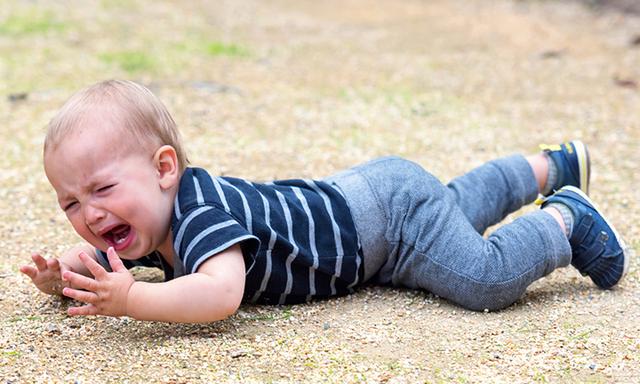
You thought you had a good sleeper. Boy were you wrong.
So you think your baby is a good sleeper. Maybe you’ve been sitting in mother’s group every week for four months feeling a little smug and a lot lucky as you hear stories of five feeds a night and hours spent rocking screaming babies.
Or maybe you’ve been at it for a year and a half. You made it through sleep training and dropping naps and you think you’re out of the woods.
You are so not out of the woods. The 18-month sleep regression is a thing. (So is the four-month regression, but that’s a story for another time).
Sleep experts say it coincides with the time when a baby becomes a toddler.
“For many parenting experts, ‘toddler’ is the term used after 12 months, or after a baby starts walking,” Baby Sleep Science expert, Dr Evans writes.
“When it comes to sleep, the graduation from ‘baby’ sleep to ‘toddler’ sleep usually happens around 18 months.”
Ah, the good old days. Photo: iStock
Want to join the family? Sign up to our Kidspot newsletter for more stories like this.
“The tried and true baby bedtime you’ve had for months stops working”
When children transition from baby to toddler, go from two naps to one, says Dr Evans.
“The sleep regression that many toddlers experience is caused by an explosion of cognitive and emotional development.”
It can affect bedtime. “Recent research has shown that the biological bedtime conferred by the circadian rhythm drifts by as much as an hour later during toddlerhood.
“In other words, the tried and true baby bedtime you’ve had for months stops working.”
In short, it’s the worst. You end up with a child who’s dropped a nap and is exhausted as a consequence. But will he sleep at bedtime? No way. “The strongest drive to be awake happens right before the biological bedtime,” Dr Evans says.
This is your reality today. Photo: iStock
Not at 18 months yet? Read about why the four-month sleep regression doesn’t have to be so hard but also how it’ll probably make your cry.
“It’s a maturation rather than a regression”
Paediatrician Phil Boucher calls the 18-month regression a “sleep maturation or evolution”.
“These sleep changes are entirely normal and an expected part of development,” he told Today’s Parent.
The sleep evolution comes with a lot of behavioural change and pushing boundaries. Bedtime and naptime stretch for what seems like forever, and toddlers sometimes spend so much time resisting sleep, they end up overtired and unable to sleep.
The solution is routine. “Your child can’t tell time, and he can’t tell that he should be going to bed,” says Boucher. “But if he knows there is a similar short sequence preceding bedtime, he can prepare himself to go down [quickly].”
Night wakings are trickier and might require a steely resolve. If they’re in a big-girl-or-boy- bed, your toddler might turn up in your room in the middle of the night.
If you’re weak like me (and you secretly love the cuddles) you might let them sleep in your bed. If you believe grown-up beds are for grown-ups, sleep psychologist Lynelle Schneeberg recommends sitting in a chair in your child’s room until she falls asleep.
I’m never going to let you sleep again. Photo: iStock
It’s normal. Wait it out
Some believe the “regression” actually has nothing to do with sleep and everything to do with milestones.
There are lots of different developmental milestones and they can be physical – like (rolling over, crawling, cruising around and finally, walking); or emotional and involve things like separation anxiety and clinginess to one – or both – parents. They can also be neurological, when critical periods of development are happening in your baby’s world.
You’ve probably noticed these development periods. They can manifest as clingy, fussy behaviour, and as disruption to a baby’s sleep pattern. Hence the regression.
By “milestones” did you mean “tantrums”? Photo: iStock
This too shall pass
What does that mean for you? The adage “this too shall pass” applies here. There’s not much you can do about your baby hitting milestones or following the sleep patterns of billions of babies that came before it.
Like with so many things about parenthood, this is one of those situations where you might just have to wait it out.
In other words, your baby will sleep again. You will sleep again.
(Until he’s 17 and he borrows your car to go to a party and it’s 1am and his phone is switched off. You won’t be sleeping then either.)


